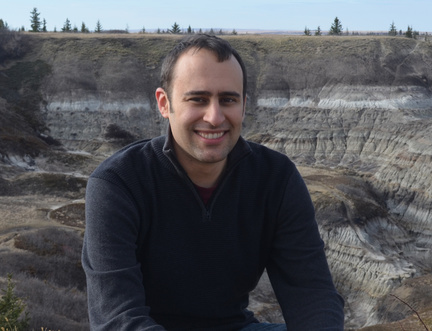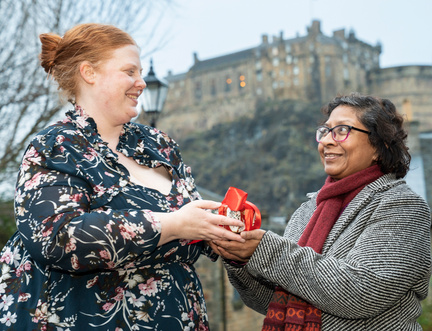More articles Monday 27 August 2018 10:30am
Nixon Helped Save Vital Dinosaur Fossil Site Says Expert Steve Brusatte

Richard Nixon may be synonymous with Watergate, but he nevertheless helped preserve a remarkable dinosaur fossil site in New Jersey, according to Dr Steve Brusatte. The Edinburgh-based paleontologist was speaking yesterday with the children’s author Philip Ardagh about his new book, The Rise and Fall of the Dinosaurs at the Edinburgh International Book Festival.
The Riker Hill Fossil Site, across the Hudson river from New York City, originally a quarry, has provided significant evidence for the mass-extinction period, about 200 million years ago, which helped establish dinosaurs as the dominant life on the planet.
“A lot of people became interested in those tracks back then; in particular a 14 year old boy called Paul Olsen, who was really obsessed,” Brusatte explained. “For months he would go to this quarry every day and map the dinosaur tracks, excavate new layers and find new tracks—and he outlasted most of the other collectors and even the scientists who were working on it. He fell in love with this site so much that he wanted to protect it.
“Olsen just started writing letters to the President. Nixon did write back; they did have a bit of a correspondence, and Nixon did help get the site preserved (as a National Natural Landmark),” he said. “It is now a park—a small oasis where people can go see real dinosaur footprints in the rocks and get a feel for what it’s really like to find fossils.”
Olsen went on to become a geologist and palaeontologist who devoted much of his career to studying dinosaur footprints across the US Eastern seaboard, as well as mentoring numerous students including Brusatte.
Brusatte’s book is as much a history of paleontology as the dinosaurs themselves, and he remains amazed by some of the stories he unearthed concerning the science’s own “Wild West” period during the latter half of 18th century. “As the Western United States were opening up, this was the age of cowboys and the gold rush and all those sorts of things. People were finding a lot of dinosaur bones, but they were the same unsavoury types of characters that were out looking for gold, working on the railways.
“The people orchestrating them were very posh, fairly aristocratic academics out east: Othniel Charles Marsh at Yale, and Edward Drinker Cope in Philadelphia. They hated each other to the extreme; they would send teams of people out west who would ransack each others’ camps, steal bones from each other, sabotage each other. Thank goodness we don’t do science like that any more.”
Thankfully, paleontology is a far more diverse, cooperative and international field today, as can be seen in Scotland. The country may not be full of dinosaur skeletons, but the Isle of Skye in particular has proved invaluable in terms of footprints. “Those humble fossils they may not be as exciting as a skeleton, but they can tell us a whole lot about the actual animals – how big they were, how they were behaving, and what environments they were living in.
“What’s great about this is it’s a collaborative project, with other paleontologists in Scotland. We’re all working together and we’re also using this as a training ground for our students—we run a Masters programme here at the University of Edinburgh, and of course a PhD course. Every year we bring our students out: some of them are getting their first field experience, and some of them find the most amazing things and do the most amazing work.
Brusatte’s Book Festival audience was privileged to hear some exclusive news. “One of my students – a guy called Paulo – found a new footprint site with a totally new kind of dinosaur, one of those duck-billed types of dinosaurs we didn’t think lived in the middle part of the Jurassic, 170 million years ago, when the Skye dinosaurs were around. So that’s totally new, just found randomly by a student who’s come here from Brazil to work on an exchange programme. Another student of ours, Amelia, found a skeleton a few years ago, of a pterodactyl – possibly the best find that anybody’s made there.
“What’s been particularly rewarding for me, coming from America, is that I’ve been incredibly, totally welcomed here,” Brusatte said. “I’ve also been able to convince a lot of other students from all over the world to come and study here with us. That’s just really an amazing thing, and I think we should all be proud that we have in Scotland this sort of society where a lot of people from all over the world still want to come.”
- 2025 Festival:
- 9-24 August
Latest News
 Communities Programme participants celebrate success of 2024
Communities Programme participants celebrate success of 2024



